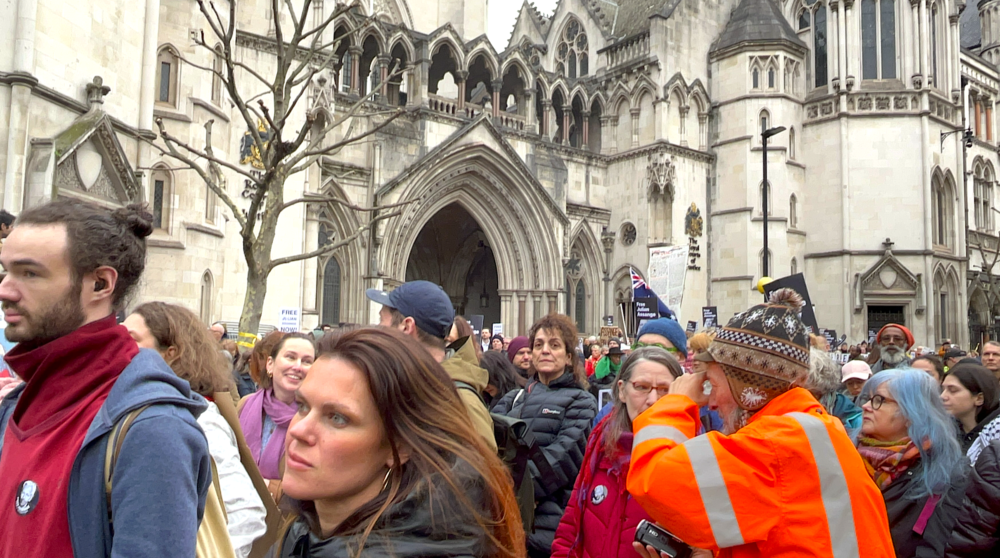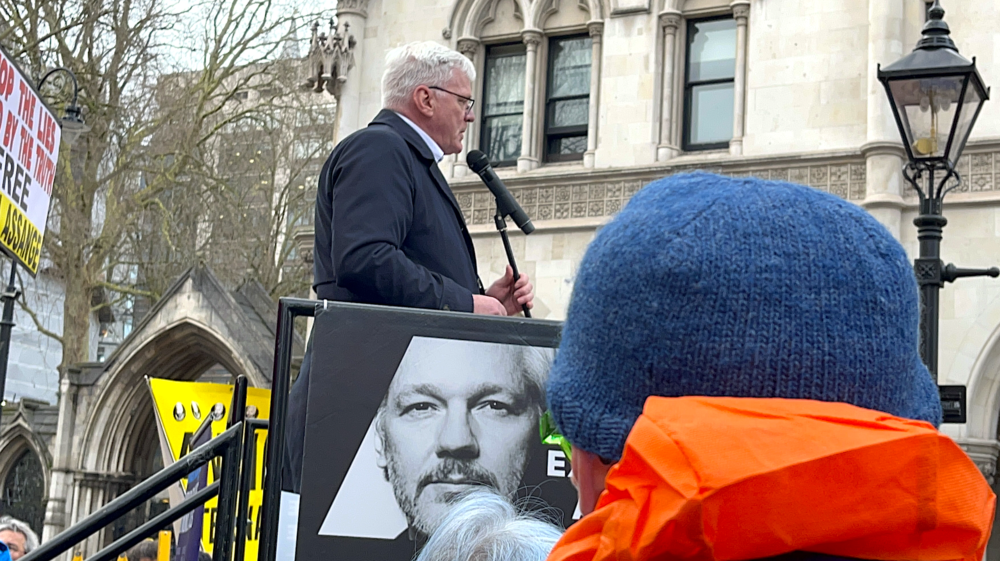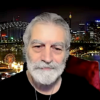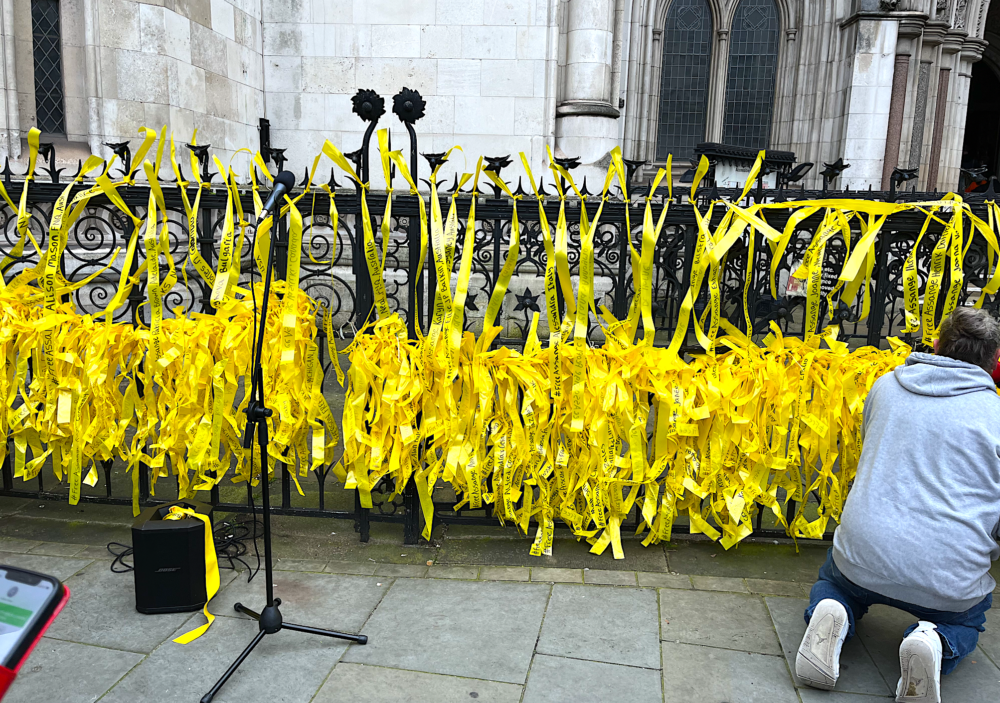A delusory tale that turns journalism into a unique evil because it exposes secret U.S. crimes was heard in a London courtroom on Wednesday with Julian Assange’s fate yet to be determined, reports Joe Lauria.
By Joe Lauria
in London
Special to Consortium News
On the second and final day of Julian Assange’s High Court hearing, barristers for the United States wove a delusory tale in which journalism is espionage, First Amendment rights are stripped from foreigners on U.S. soil and a government hunting a dissident journalist who revealed its secret crimes is lauded as a beacon of democracy.
However, outside the courthouse on a street called The Strand; and with human rights and press freedom organizations, presidents, prime ministers, and parliaments and with millions of ordinary citizens around the world, this false construct the United States seeks to impose on the world is failing.
Extraordinary support at court in London for #DayX.
This is what it looked like when I walked out when we broke for lunch.
Tomorrow after day 2 of the arguments we will march from court to Downing Street. #FreeAssangeNOW pic.twitter.com/NQHgYmgm8K
— Stella Assange #FreeAssangeNOW (@Stella_Assange) February 20, 2024
In the immediate moment, the life of Julian Assange, an imprisoned journalist who published some of America’s darkest secrets, shattering its self-image, remains subject to the deliberation of two British judges wearing wigs.
Justices Jeremy Johnson and Dame Victoria Sharp informed the court after 10 hours of hearings over two days that they are reserving their judgment of Assange’s fate for an unspecified future date. A deadline of March 4 was given for final submission of papers. A decision can come any time after that.
Johnson and Sharp are considering whether to allow Assange to appeal the home secretary’s extradition order and various points of law in the magistrate court’s decision three years ago.
She had ordered Assange released on health grounds but on the basis of assurances that it would not mistreat Assange in the United States, the U.S. won on appeal at the High Court and reversed her decision.
The U.K. Supreme Court then refused to take Assange’s challenge of the legality of these assurances and last June a single High Court judge also refused Assange’s leave to appeal. This week’s two-day hearing was an attempt by Assange to reverse that decision, an appeal for the right to appeal, as it were.
It was a dry-run to try to convince the judges that there is enough contested evidence in this case to permit a full-blown appeal.
It was possibly Assange’s last stand in Britain to avoid being sent in chains to the U.S. to face espionage and computer intrusion charges and up to 175 years in a maximum-security prison.
After Assange’s lawyers laid out their case Tuesday why Assange should be allowed to appeal, it was the turn of barristers for the U.S. on Wednesday to argue why he should not.

Part of the crowd of hundreds of Assange supporters who flooded the Royal Courts of Justice. (Joe Lauria)
Journalism Dressed Up as Crime
In doing so, prosecutor Clair Dobbin constructed a fantastical story of an evil Assange using nefarious methods to instigate and conspire with a U.S. intelligence analyst to break into government computers with the express purpose of getting informants killed or disappeared and threatening America’s hallowed national security.
She relied heavily on the affidavit of the dodgy U.S. prosecutor Gordon Kromberg. She wove the same sorry tale of Assange “recruiting” Army analyst Chelsea Manning and conspiring with her to steal vital U.S. secrets, when the evidence is overwhelming and on record in court that Manning had security clearance to get all these documents, that she had already transferred the vast majority of them to WikiLeaks before Assange “recruited” her in a chatroom (if it was Assange she was speaking with at all) and that Manning could not hide her identity by cracking a password with Assange’s help even if she wanted to.
What Dobbin was actually doing was wasting the court’s time by describing some of the most routine aspects of journalism: seeking out sources, protecting their identity and trying to get as much information out of them as possible.
‘Disappearing’ Informants
Once again the U.S. tried to tell the court that Assange’s actions were not that of a “responsible” journalist but of a criminal who intentionally wanted U.S. informants to be killed or disappeared by revealing their names.
Dobbin said that it was the mainstream partners who had redacted their names, when the exact opposite was true.
Mark Davis, an Australian journalist who covered Assange in London in 2010 when the major releases were being coordinated with the mainstream newspapers, said those papers had little interest in redaction and that it was Assange who stayed up virtually an entire weekend to redact the names.
John Goetz, an American journalist who worked with one of the partners, Der Spiegel, testified at Assange’s 2020 extradition hearing that Assange was obsessed with redactions and Laura Poitras’ film Risk shows Assange calling the State Department to ask them to help redact the Diplomatic Cables. The State Department refused and instead demanded he return the cables.

WikiLeaks Editor-in-Chief Kristinn Hrafnsson addressing supporters outside the courthouse. (Joe Lauria)
Though the U.S. argument that Assange harmed informants rests on blaming him for publishing the un-redacted cables, there is copious evidence that has been presented in this case to show that it was two Guardian journalists who revealed the password to the un-redacted cables and that hundreds of publications, such as cryptome.org and Pirate Bay, had published them before WikiLeaks did.
Assange said he published them only to alert those whose names had already been revealed to seek safety and to ensure that the authentic cables, and not possible fakes, were made public. But he never intended to publish the un-redacted documents at all had they not been already released.
Since the classified material had already been published by others before WikiLeaks did, Assange did not violate the Official Secrets Act, which, unlike the U.S. Espionage Act, only punishes first-time publication. Thus dual-criminality was not breached, which should on its own invalidate Assange’s extradition.
U.S. Brigadier General Robert Carr, who led the post-Wikileaks investigation into the disclosures’ impact, also admitted under oath at the Manning court martial that no one was killed as a result of the WikiLeaks revelations.
Dobbin acknowledged in court after questioning from Justice Johnson, that others published the un-redacted cables first. But she said that didn’t matter because it would never have happened at all if Assange had not gotten his hands on the documents in the first place.
‘Political Offense’
As Assange lawyer Mark Summers asserted, the lawyers for the U.S. completely ignored the content of the releases for which Assange is being prosecuted. He argued on Wednesday as he had the day before, that there is a nexus between Assange’s publications and his pursuit by the United States, making that government no better than any authoritarian regime that hunts down a journalist for revealing their secrets.
After Assange’s lawyers argued that both the U.K.-U.S. Extradition Treaty and the implementing Extradition Act of Parliament barred extradition based on a political offense or a political opinion and that espionage is inherently political, Dobbin contended that Assange’s prosecution could not be political because two U.S. administrations, one Republican and one Democratic, stand behind his indictment.
This displayed a tremendous lack of understanding of the generally solid, bi-partisan agreement on U.S. foreign policy — essentially both parties band together for the U.S. against the world.
It also showed extreme narrowness to reduce the term “political” to party politics, rather than to an entire military, intelligence, industrial and political system pursuing mammoth interests around the world for which it is ready to kill, and has killed, millions of people who stand in their way.
What does it mean to them to destroy a single Australian journalist who has done them such harm?
A World Moving On
The U.S. arguments inside oak-paneled Courtroom 5 at the Royal Courts of Justice, constructed in 1882, may as well have been made that year. They are losing resonance in a world that is rapidly moving on from American rule, sped up by the globe’s rejection of U.S. policy on Ukraine and Gaza.
Dwindling are the number of governments and populations who accept at face value what the United States says about itself and about them.
Assange’s work has played a vital role in this process, chipping away at American credibility, beginning with the 2010 releases about Iraq and Afghanistan, for which he is being prosecuted.
American credibility has fallen to the point where a British barrister can stand up in a British court and tell British judges that the United States is no different than any authoritarian regime in hunting down a journalist just because he had published secret evidence of their deepest crimes.
When Summers several times over the course of two days explicitly mentioned American war crimes, there was no flinching on the faces of either judge.
Yet there are millions of people in the world, especially in the United States and Britain, who still believe the fantasy world sustaining what is left of American dominance, the world in which Assange is a villain intent on destroying democracy.
Dare these two judges step outside that world to at the very least allow Assange his day in court to fight for his freedom?
[Read Consortium News‘ detailed live-tweeting during both days of the hearing: Day 1 morning – defence; Day 1 afternoon – defence; Day 2 morning – prosecution; Day 2 afternoon – prosecution + defence rebuttal; Reserved judgement]
Joe Lauria is editor-in-chief of Consortium News and a former U.N. correspondent for The Wall Street Journal, Boston Globe, and other newspapers, including The Montreal Gazette, the London Daily Mail and The Star of Johannesburg. He was an investigative reporter for the Sunday Times of London, a financial reporter for Bloomberg News and began his professional work as a 19-year old stringer for The New York Times. He is the author of two books, A Political Odyssey, with Sen. Mike Gravel, foreword by Daniel Ellsberg; and How I Lost By Hillary Clinton, foreword by Julian Assange. He can be reached at [email protected] and followed on Twitter @unjoe



Assange was said to be too unwell to attend the court for this hearing. I think the desired outcome for the US/UK would be for Assange to die in prison here in England, which dragging these pantomime proceedings on for even more months and years almost certainly will achieve.
The conversation is fixated on the courts…In the meantime the general usa public can care less as they ‘Want’ and ‘Need’ to be told what is truth as they intentionally deny their own history; all while they covet the ‘men’ made in their ‘gods’ image…And of course the almighty dollar. The managerial class will never jeopardize their comfort. Not even for their own children nor the living planet. This escapade is just another example of the people’s willingness to bend down before the empire.
The conversation is fixated on the courts…In the meantime the general usa public can care less as they ‘Want’ and ‘Need’ to be told what is truth as they intentionally deny their own history; all while they covet the ‘men’ made in their ‘gods’ image…And of course the almighty dollar. The managerial class will never jeopardize their comfort. Not even for their own children nor the living planet. This escapade is just another example of the peoples willingness to bend down before the empire.
As has been said many times: the US/UK make a mockery of the rule of law daily. The law and taxes are only for the “little people”, the TBTF banksters are above the law, and war criminals are REWARDED instead of punished. The mendacity, hypocrisy, arrogance of US/UK officials, judges, politicians is maddening – my blood pressure skyrocket.
It would be one thing just to be honest about it: “we don’t care about the law, Assange will have to suffer because he embarrassed some powerful people and the AngloZionist Empire as a whole.” We will make an example out of him, and we will use any means necessary: abuse the law, abuse power and make a laughingstock of British and US “Justice”
They support/enable/fund the Genocide of Palestine, persecuting political prisoners like Asssange, imposing illegal siege warfare on Afghanistan, Venezuela, Cuba, etc. violating the AECA by shipping weapons to Ukraine, Israel etc. Bombing entire countries into the Stone Age, based on willful transparent lies (Iraq, Afghanistan, Libya etc.)
Bush Jr. and Tony Blair are lauded as senior statesmen, while they make millions selling books, paintings, public speaking engagement fees, influence peddling, etc. If there were any “justice” Blair/Bush et al. would be in prison for life, and Assange would have never been imprisoned at all.
Anyone who has been following Julian Assange’s case will know that he is innocent of all of charges against him. Charges that have been contrived by two vindictive, unscrupulous governments, whose sole purpose is to gain revenge because he disclosed the truth. It is impossible not to believe that any sane person, let alone a judge, could arrive at a conclusion other than Julian is innocent of all charges. That being the case, if the appeal is not accepted and the judges do not find in his favour, then other factors will have taken precedence over justice. Joe Lauria has clearly indicated in this article those factors, contrived by two corrupt governments, devoid of any scruples, full of revenge, are attempting to convict and punish an innocent man. Little do the know that of by pursuing Julian, not only do they continue to highlight their own egregious crimes but are also highlighting the extremes they are prepared to go at the expense of the reputation of both judicial systems, which if Julian is convicted will have been irreparably damaged. If he is convicted, the infamy of this case will be remembered as one of the greatest miscarriages of justice in this century.
How can someone who is not a US citizen, has not lived in the US and who committed what the Americans called a crime while OUTSIDE the US be put on trial in the United States. That is fascist thuggery of the worst kind.
The US wants to establish that its jurisdiction is international and not bound by its Bill of Rights. This is also what so-called “globalism” and “free trade agreements” [sic] are about.
Democracy, at least as it exist in larger groups, was not generated by capitalism, but by agrarian mercantilism, when local powers had motive to join powers but did not want to release sovereignty to a head of state. That’s why voting generally involves some parts of the population and not others. What early manufacturing capitalism generated was fascism.
What has evolved since the accords of ’45 is not exactly fascism as it existed. We might call it corporatocracy, but that does not hint at its darker recesses. A corporation is, after all, a construction of law, at least in theory. When the corporation can subvert the state, what remains is rule by mafiosi.
This is repressive, but also worse than that. It is deranged in form, even without the occasional leader dropping into madness or mysterious gods demanding sacrifice. Decisions are to be made by profit and by conveniences of power, which run skew to any sort of human benefit.
To accomplish this, the would-be fascists disencumber themselves from local laws and jurisdictions, from dependencies and allegiances involving local populations, such as finally limited even royalist and fascist states at war.
Again, that is what so-called “globalism” and “free trade agreements” are about.
After considerable delay (process as punishment), I think the two-judge panel will allow Julian’s appeal to go forward. We’ll then see more procrastination in scheduling the appeal for hearing before the High Court (process as punishment). If the High Court were to hear the case before November, their decision would be delayed until after the US election, maximizing (you guessed it) process as punishment.
After the shellacking the prosecution received in the Royal Courts this week, the Biden team cannot possibly want an Espionage Act trial of an award-winning journalist to come to America’s shores during election season. On Tuesday, the PBS NewsHour gave us a taste of what government-friendly coverage of such a trial would look like. Their propaganda is risible.
hxxps://www.pbs.org/newshour/show/wikileaks-founder-julian-assange-makes-last-ditch-attempt-to-avoid-u-s-
How is this fact good for Julian? He will have to remain in prison until the decision and he could die in the interim.
It’s not described as good here. He refers to this procrastination strategy as “process as punishment”.
Which is the whole idea.
To nie Rosja.
The US has always been a very dishonest broker. It doesn’t mind stepping on toes but…don’t go stepping on its toes – then it turns outright nasty.
Superlative article, Joe.
What those who operate the clandestine US government don’t seem to get is that “responsible” journalism is the obligation to impart the truth to the public whose best interests it is there to serve.
The situation, in fact, is the opposite: the regime in power serves the interests of those who run the underhanded show.
The long ongoing, despicable persecution of Julian Assange is their Command Performance.
When the curtain finally comes down, hoping against hope, the actors, singers and songwriters will be dismissed by the audiences disgust; made aware of the truth, in their own consciences, and walk off the stage, in shame, finally closing down the show, acknowledging their loathsome performance; which in no way portrays the shows title:
‘The Justice of True Journalism’.
“Dobbin acknowledged in court after questioning from Justice Johnson, that others published the unredacted cables first. But she said that didn’t matter because it would never have happened at all if Assange had not gotten his hands on the documents in the first place.”
This argument is, of course, specious.
Assuming a password lenth of 20 (it was longer) and only the use of upper and lower case letters (there were other types of characters) the passphrase space to search for a brute force attack is:
20896178655943101411324274803736576 possible passwords,
or 10^36. Assuming a crack attempt is possible every microsecond and that there are 10^9 seconds in a year (there are less), then it would take millions of times of the current age of the Universe to crack the data.
People really dont understand cryptography. (The fast solution is quantum computing, but that seems decades away from public availability.)
See also Christian Grothoff’s testimony at the Magistrate’s hearing.
hxxps://www.craigmurray.org.uk/archives/2020/09/your-man-in-the-public-gallery-assange-hearing-day-14/
Aw, c’mon, Joe. We all know the fix is in. There is almost no chance that Julian will get anything like a non-kangaroo court decision. British courts don’t dispense justice, nor do American courts.